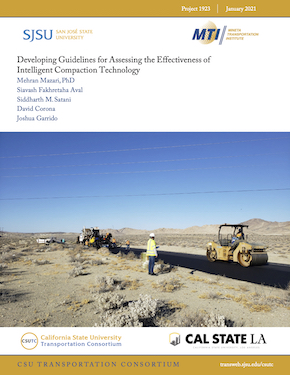- 408-924-7560
- mineta-institute@sjsu.edu
- Donate
Developing Guidelines for Assessing the Effectiveness of Intelligent Compaction Technology
Many factors affect pavement compaction quality, which can vary. Such variability may result in an additional number of passes required, extended working hours, higher energy consumption, and negative environmental impacts. The use of Intelligent Compaction (IC) technology during construction can improve the quality and longevity of pavement structures while reducing risk for contractors and project owners alike. This study develops guidelines for the implementation of IC in the compaction of pavement layers as well as performing a preliminary life-cycle cost analysis (LCCA) of IC technology compared to the conventional compaction approach. The environmental impacts of the improved construction process were quantified based on limited data available from the case studies. The LCCA performed in this study consisted of different scenarios in which the number of operating hours was evaluated to estimate the cost efficiency of the intelligent compaction technique during construction. The analyses showed a reduction in energy consumption and the production of greenhouse gas (GHG) emissions with the use of intelligent compaction. The LCCA showed that the use of IC technology may reduce the construction and maintenance costs in addition to enhancing the quality control and quality assurance (QC/QA) process. However, a more comprehensive analysis is required to fully quantify the benefits and establish more accurate performance indicators. A draft version of the preliminary guidelines for implementation of IC technology and long-term monitoring of the performance of pavement layers compacted thereby is also included in this report.
MEHRAN MAZARI, PhD
Mehran Mazari is an Assistant Professor in the Department of Civil Engineering at California State University specializing in Transportation Infrastructures and Materials. His research interests include sustainable and resilient transportation infrastructure, transportation geotechnics and pavement materials, and non-destructive evaluation of transportation infrastructures. He has been actively involved in a number of national and state-funded research projects; he is also a member of technical committees at the Transportation Research Board (TRB) of National Academies of Science and Engineering and the Highway Pavement Committee of the American Society of Civil Engineers (ASCE). Further, Dr. Mazari is the faculty director of the Sikand Center for Sustainable and Intelligent Infrastructure and founding director of Sustainable Infrastructure Materials (SIM) research lab at California State University Los Angeles.
SIAVASH F. AVAL
Siavash is a research associate at the Department of Civil Engineering at California State University Los Angeles working on transportation infrastructure materials projects. He holds a master’s degree from the University of Massachusetts Dartmouth.
SIDDHARTH M. SATANI
Siddharth was a graduate student at the Department of Civil Engineering at California State University Los Angeles. He is now a project engineer at Mott, McDonald working on highway- and transportation-related projects.
DAVID CORONA
David is an undergraduate student at the Department of Civil Engineering at California State University Los Angeles. He is the recipient of the 2021 Transportation Research Board (TRB) Minority Fellowship. His main research interest is transportation engineering.
JOSHUA GARRIDO
Joshua is a graduate student at the Department of Civil Engineering at California State University Los Angeles. He is the recipient of the 2019 Transportation Research Board (TRB) Minority Fellowship and the 2020 Dwight David Eisenhower Transportation Fellowship from the Federal Highway Administration (FHWA). His main research interests are transportation engineering and data visualization.
-
Contact Us
San José State University One Washington Square, San Jose, CA 95192 Phone: 408-924-7560 Email: mineta-institute@sjsu.edu






